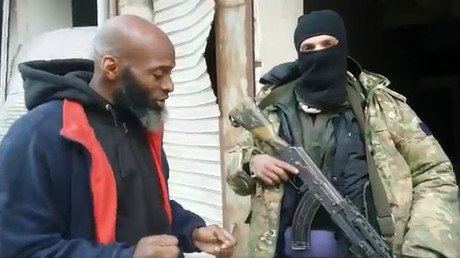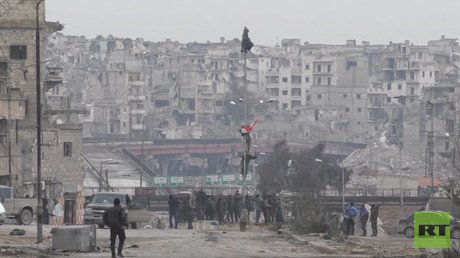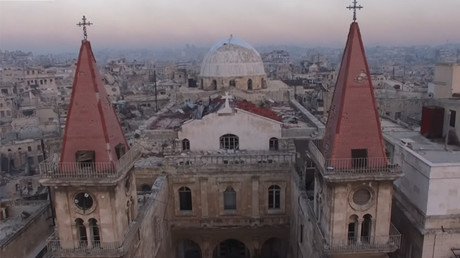‘No one shot at evacuees’: Filmmaker who witnessed Aleppo liberation speaks to RT
The Syrian army did not shoot at militants leaving Aleppo under the evacuation deal and it was even distributing food among them, Carla Ortiz, a Bolivian documentary filmmaker who spent eight months in Syria, told RT as she disputed some MSM narratives.
Ortiz was filming a documentary about the people caught in the Syrian conflict and had an opportunity to witness the liberation of eastern Aleppo firsthand, including the evacuation of militants and their families from the city.
She has published a video from her upcoming documentary showing the process of evacuation to contest western media claims that Syrian government forces fired on the evacuees as proof that the evacuation, which took place under the deal brokered by Russia and Turkey, was peaceful.
“Many have asked me to show proof that people and children were not shot at on the streets while the evacuation took place as some media reported. So, this is what I saw: civilians evacuated on foot from the east, then transported in buses to the shelters. I am sorry, but there was absolutely no mass shooting on the evacuation,” Ortiz wrote in a Facebook post, commenting on the video.
She added that “what the Syrian army and civilians were doing was throwing food through the windows” of the buses that transported the evacuees out of the city.
Ortiz then went on to contest some other MSM narratives by doubting the authenticity of the so-called “witness reports” from then-rebel-occupied areas of Aleppo that quickly went viral on the western media. She particularly stressed that the eastern part of the city had no internet connection that could allow those witnesses to upload their footage or send them to the western media companies.
Ortiz added that, even though she had a mobile phone with international roaming and Wi-Fi, she could not send even a short text message to her family out of eastern Aleppo.
“When I was in east Aleppo, in neighborhoods that were just liberated, there was no internet – I could not even tell my family I [had] made it alive. It is impossible to upload a video there. I had to upload a video in a hotel and it took me more than two hours,” Ortiz told RT.
“For me it is just insane to think that this footage is happening over there,” she added.
At the same time, she admitted that eastern Aleppo was indeed “an eye of conflict” and “an absolute devastation,” which she said was caused not just by the actions of the Syrian army or the Russian bombing raids but by the militants who held those areas.
While western Aleppo “sometimes lacked electricity and water supplies, although businesses there were still running” and people carried on with their lives, in the east of the city there was only terror and devastation.
“When you talk to someone, who just left east Aleppo… they say they had no food, no access to electricity, no medicine; their children were unable to go to school,” Ortiz said, adding that the people there had sometimes “to lock up their children because the terrorists used the children to blackmail their family members into staying quiet or doing something for them.”
Conditions the civilians lived in under the so-called rebels were “really inhuman,” she stressed, adding that most militants, who held the eastern part of the city, were foreign mercenaries.
“When you talk to someone who just left east Aleppo, they tell you that most terrorists are not even Syrians,” Ortiz said.
Ortiz said she witnessed snipers targeting civilians on the streets of eastern Aleppo when she tried to get to that part of the city.
Most Aleppo residents welcomed the liberation of the city by the Syrian army regardless of their political beliefs, as they were just happy to be finally free from the militant rule, Ortiz said.
People “were full of hope and happy when they were crossing from East Aleppo to the western part of the city. They were thanking God and the Syrian army. They had nothing to do with politics. They were not talking about supporting one side or another side, they were just happy to be free,” Ortiz said.
She also stressed that many soldiers who fought on the side of government forces in Aleppo were actually local “volunteers, who were fighting to get some of their family members out of east Aleppo.”
Ortiz also welcomed the Syrian nationwide ceasefire deal, which was recently brokered by Russia and Turkey and entered into force Friday. This agreement “could determine many things at this exact moment,” she said, adding, “It could really answer to the prayers of people.”
“I was able to communicate with all these people of any ages, of different religions – they are all praying for a real ceasefire,” Ortiz said.















